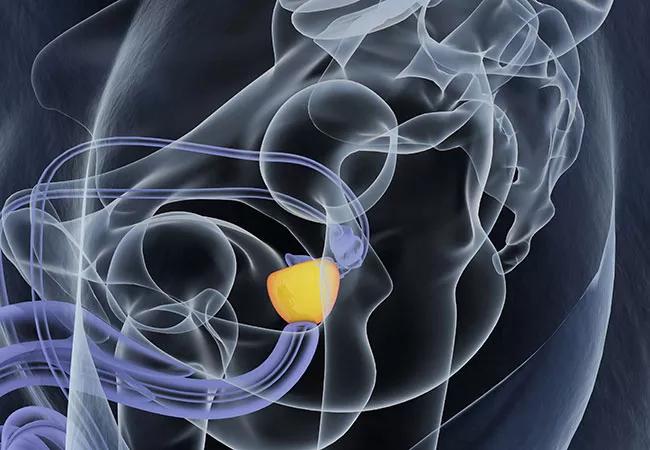Increased preparedness improves patient expectations of postoperative sexual function

Men who reported good preoperative understanding of their prospects for recovering sexual function after radical prostatectomy had more accurate expectations of their recovery and reported better sexual function outcomes than men who did not demonstrate good understanding, according to results of a Cleveland Clinic study presented at the annual meeting of the American Urological Association.
Advertisement
Cleveland Clinic is a non-profit academic medical center. Advertising on our site helps support our mission. We do not endorse non-Cleveland Clinic products or services. Policy
“The more prepared a man was before undergoing prostatectomy, the more likely he was to report his recovery was going as expected,” says Bradley C. Gill, MD, MS, study author and staff in Cleveland Clinic’s Department of Urology, Glickman Urological and Kidney Institute.
Two hundred and ten men scheduled to undergo radical prostatectomy between 2015 and 2017 were enrolled in a preoperative group education seminar led by advance practice providers. The session covered the expected postoperative course, including the probability of erectile dysfunction and expectations for recovery of erections. Patients were asked to complete surveys about their expectations and understanding at baseline, and interviewed by telephone at three weeks, three months, six months and one year.
Of 147 men with intact erectile function at baseline, 62.6% (92) completed a survey at three weeks, 46.9% (69) at three months, 32.7% (48) at six months and 24.5% (36) at one year after surgery. Partial or full erections increased from 20.7% at three weeks to 58.3% at one year. However, patient-reported satisfaction with erections (defined as erections that were “as expected” or better) decreased from 56.8% at three weeks to 11.8% at one year. Dr. Gill suggests that the difference between the subjective and objective measures of erectile function “shows men coming to the realization that they may have reached their peak recovery and perhaps that they didn’t recover as much function as they hoped they would.”
When the group was divided into those who had good understanding preoperatively and those who didn’t despite going to the educational seminar, those in the former category were more likely to report that their erections were “as expected” or better after surgery than those in the latter category (52.5% versus 0% at three months [P = 0.006] and 45.2% versus 0% at six months [P = 0.003]). Not surprisingly, among men who did not experience any recovery of erectile function, the proportion who said their erections were “as expected” was reduced from 48.5% at three weeks to 0% at one year (P < 0.05).
Advertisement
“Although we did not have a control group in this study, by identifying the men who were more prepared for surgery and comparing them with those who were less prepared, we were able to determine the impact of preparedness between these two groups — and the bottom line was that better preparedness led to more accurate expectations and greater patient satisfaction,” says Dr. Gill.
“We counsel all men considering radical prostatectomy that the amount of erectile function recovery they’ll achieve is dependent in large part on the amount of function they have going into surgery and the extent of their cancer,” explains Dr. Gill. “Obviously, if they have more advanced cancer that requires wider resection and removal of nerves that produce erections, they’re more likely to have impaired recovery erectile function after surgery.” The surgeons also explain that the majority of recovery will occur during the first 12 months after surgery, although recent evidence shows improvements in erections can continue to occur up until 18 months. “This suggests we need to both prepare men well for the surgery and counsel them to be patient during their recovery,” Dr. Gill concludes.
Advertisement
Advertisement

Pediatric urologists lead quality improvement initiative, author systemwide guideline

Fixed-dose single-pill combinations and future therapies

Reproductive urologists publish a contemporary review to guide practice

Two recent cases show favorable pain and cosmesis outcomes

Meta-analysis assesses outcomes in adolescent age vs. mid-adulthood

Proteinuria reduction remains the most important treatment target.

IgA nephropathy is a relatively common autoimmune glomerular disease that can be diagnosed only by biopsy

Oncologic and functional outcomes are promising, but selection is key